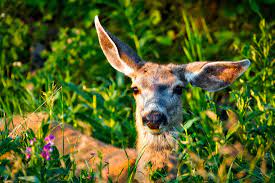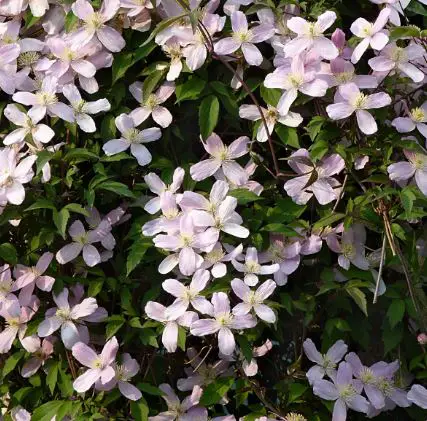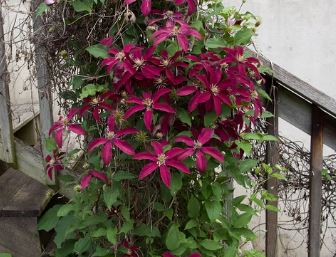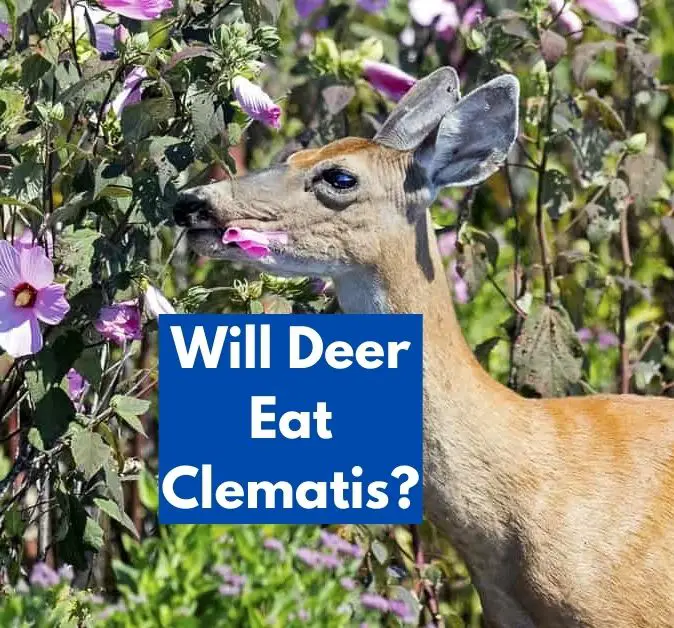If you’re like most gardeners, you probably have at least one clematis vine in your garden. Clematis are beautiful flowers that add a touch of elegance to any garden. But do deer eat clematis?
The answer is yes – deer will eat clematis vines and blooms. Deer love clematis because they’re usually well-watered, fertilized, and are tasty to them.
Considering that a single deer can eat several pounds of plants each day, you can see how deer eating clematis vines can really do some serious damage to your garden!
In this article, we’ll discuss how to stop deer from eating your clematis and why they eat them in the first place.
Why Do Deer Eat Clematis?

As we covered, deer will eat every part of clematis (vine, leaves, blossoms, and all) when they’ve got the chance.
But why do they do this?
Deer like lush plants that are well-watered and fertilized, and clematis check every box.
They also have sweet leaves which are very palatable to deer, and clematis are easy on a deer’s digestive system.
The smell of clematis is also very enticing to deer, and it doesn’t have any natural predators so it’s rather plentiful.
Deer can do some serious damage to a large amount of clematis vines in a single sitting if they’re hungry enough!
This was confirmed in a 1999 study on deer plant eating habits by Cornell University.
Flowers like clematis contain water, sugar, and nutrients, which makes them an ideal food source for deer.
And don’t think that your newer clematis are safe either: deer actually prefer new growth because they’re more tender.
Additionally, deer will consume a wide variety of foods like clematis based on opportunity.
They usually grow from the ground up onto trellises, so they’re easy for deer to access.
In fact, some folks specifically put clematis vines around their food plots to attract deer.
If you’re not convinced, plant some clematis and wait to see what happens!
How Do I Keep Deer From Eating My Clematis?

There are a few things to keep in mind when you’re protecting clematis from hungry deer: their habits, your scent, repellent options, and when you plant them.
Deer will eat nearly anything if they’re hungry enough, so your main goal is making your garden as least inviting to deer as possible.
Check out our guide on how to keep deer from eating plants where we cover 25 quick and easy tips for keeping hungry deer out of your garden.
Will My Clematis Vines Grow Back After Deer Eat Them?
Fortunately, clematis can handle (and some variants even prefer) being cut down to 12” annually, so the deer might be doing you a favor.
If deer happen to munch down your clematis, continue regular care of your clematis plants including watering and fertilizer as necessary until they’re back to good health.
Are Clematis Plants Good For Deer?

There are no nutritional studies or facts available on clematis in terms of vitamins and nutrients that it contains.
However, clematis is typically used for joint pain and skin conditions, and it is believed that these benefits may translate to deer eating clematis as well.
Do Deer Eat Clematis? Wrapping Things Up
So, do deer eat clematis?
The answer is yes!
Deer will eat as many impatien flower plants as they can, and they benefit from the vitamins and minerals found in these flowers.
Fortunately, there are things you can do to keep them away like using fences, motion-activated devices, or reducing the enticing scent that your clematis give off to ward off deer from eating them.
Have any observations to add to the discussion? Be sure to let us know in the comments below.
Check our our other helpful wildlife guides while you’re here:
- How long do deer live?
- Can deer eat orange peels?
- Do deer eat rutabaga?
- Do deer eat buckwheat?
- Do deer eat black walnuts?
- Do deer eat hickory nuts?
- Do deer eat Bermuda grass?
- Do deer eat corn on the cob?
- Do deer eat pumpkins?
- Do deer eat mums?
- Do deer eat roses?
- Do deer eat tomatoes?
- Do deer eat sunflowers?
- Do deer eat tulips?
- Do deer eat rhododendron?
- Do deer eat hibiscus?

